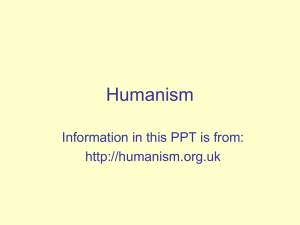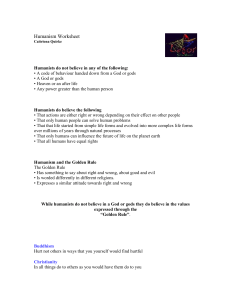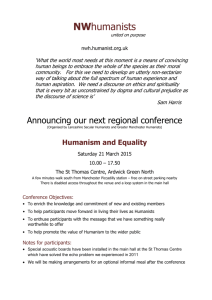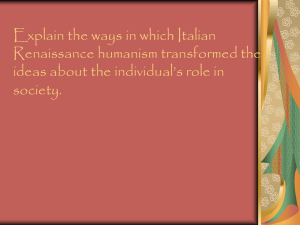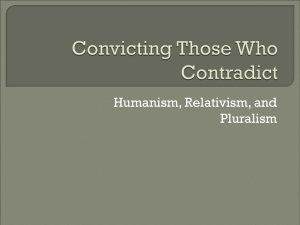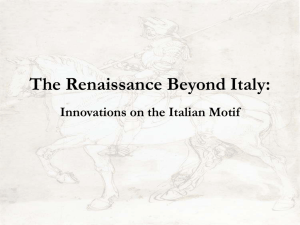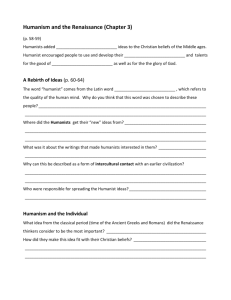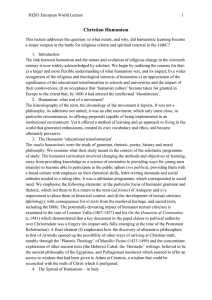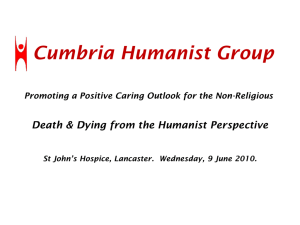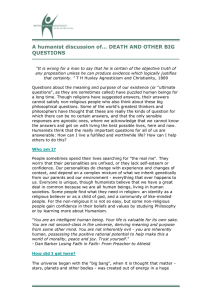humanism_and_Christianity_PowerPoint_presentation
advertisement
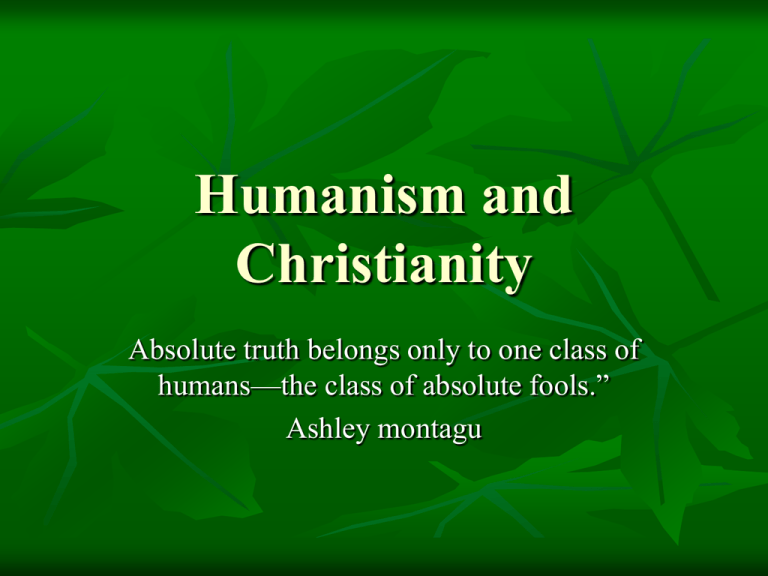
Humanism and Christianity Absolute truth belongs only to one class of humans—the class of absolute fools.” Ashley montagu Definition Humanism is a philosophy, world view, or life stance based on naturalism--the conviction that the universe or nature is all that exists or is real Humanism serves, for many humanists, some of the psychological and social functions of a religion, but without belief in deities, transcendental entities, miracles, life after death, and the supernatural. Humanists seek to understand the universe by using science and its methods of critical inquiry--logical reasoning, empirical evidence, and skeptical evaluation of conjectures and conclusions--to obtain reliable knowledge Defintions Part II Humanists affirm that humans have the freedom and obligation to give meaning, value, and purpose to their lives by their own independent thought, free inquiry, and responsible, creative activity Humanists believe that humans can live moral, happy, and productive lives on the basis of human reason and experience, without relying on the supernatural. Humanists believe in naturalistic ethics, that humans are the ultimate source of morals, values, purposes, and meanings. Moral values find their source in human experience; ethics stem from human need and interest; the purpose and meaning of life are what we make it to be. Reason Versus Faith Faith weakens the intellect by destroying the value of reasoned and empirical thinking. Faith promotes dogmatism, since there is no method by which one can use faith to decide among different points of view or even between truth and falsehood. Faith frequently results in censorship, because if contrary evidence might induce doubt, faith holds that it must be suppressed--it obviously can't be fought by using reason, since faith does not use reason. Is there any way to justify belief and thus have reliable knowledge? There is only one way known to us: the scientific method. We can justify belief by performing empirical studies, using logical reasoning, and conforming to the principles of statistical inference. We have no reliable knowledge about the supernatural and cannot rely on it. Humanists therefore accept what science says is true about our world. This includes evolution Humanist Manifesto The Humanist Manifesto II makes that clear: “As nontheists, we begin with humans, not God, nature, not deity…. [H]umans are responsible for what we are or will become. No deity will save us; we must save ourselves” (1973, p. 16). Promises of salvation are “illusory and harmful,” ethics is “situational,” and sexual activity between “consenting adults” is acceptable no matter who or what is involved. Sounds like “vice is nice” propaganda, doesn’t it? Abortion, euthanasia, homosexuality, and even what some call the “last taboo”— incest—are acceptable according to humanism. As one author put it: “While humanity did not arise from the beasts, Humanism certainly stoops to their level” God is the Alien Paul Kurtz, former editor of The Humanist, addressed the subject of “Christian humanism” and observed: “Humanism cannot in any fair sense of the word apply to one who still believes in God as the source and Creator of the universe. Christian Humanism would be possible only for those who are willing to admit that they are atheistic Humanists. It surely does not apply to God-intoxicated believers” (1973, p. 177). Humanist writer Corliss Lamont has gone so far as to state: “Passing to the New Testament, we see plainly that its theology, taken literally, is totally alien to the Humanist viewpoint” (1977, p. 50). Doctrine of Humanist Manifesto Religious Humanists regard the universe as self-existing and not created. Humanism believes that man is a part of nature and that he has emerged as the result of a continuous process. (evolution) Moral values derive their source from human experience. Ethics is autonomous and situational, needing no theological or ideological sanction. Traditional religions inhibit humans from experiencing their full potentialities. We can discover no divine purpose or providence for the human species. We are responsible for what we are or will become. No deity will save us - we must save ourselves. Socialism and Humanism the strength of Socialism consists largely in its protest against existing social wrongs to which the Church is likewise opposed but which can be finally righted only by the universal rule of Christ. ... Socialism is vitally defective in that it places the physical above the spiritual needs of mankind. It is, as a philosophy, definitely materialistic. It insists that better social conditions will produce better men Socialsim a serious Protest Socialism is... a serious protest against the social wrongs and cruelties of the age, against the defects of the present economic system, against special privilege and entrenched injustice, against prevalent poverty, and hunger, and despair.... social gospel" which discards the fundamental doctrines of Christianity and substitutes a religion of good works; but a true Gospel of grace is inseparable from a Gospel of good works Similarities There are many similarities between Christianity and Socialism, both ideologies founded by Jews who in their own lifetimes were hated by the authorities and had to flee to other countries. Marxism has its own “old and new testaments”: Das Kapital and State and Revolution respectively. There are direct comparisons between the letters of the apostles and those books written by exiles to “believers”in other countries giving advice etc. such as Lenin's “What is to be done. a new way of thinking We both want to change the world for the better, eliminate poverty of both lifestyle and health (even though Christ said that the poor would always be with us), restore and improve the natural environment and bring an end to wars. Even though we disagree on homosexuality, sex before marriage and abortion, As a Socialist I have to add that I think that at worst Christianity gives succour to the “moral majority” and at best is a comfort to people in old age. In the words of the “International”: This is the essential thought of Socialism: only we can save ourselves and only we can do it for ourselves. The choice before people at the start of this new century is between Socialism and capitalist barbarism, and sadly, spiritual ideas will have to wait for the time being.
